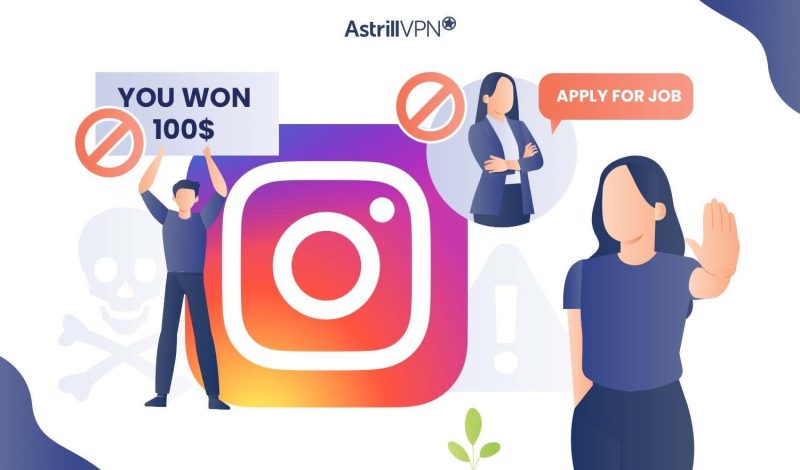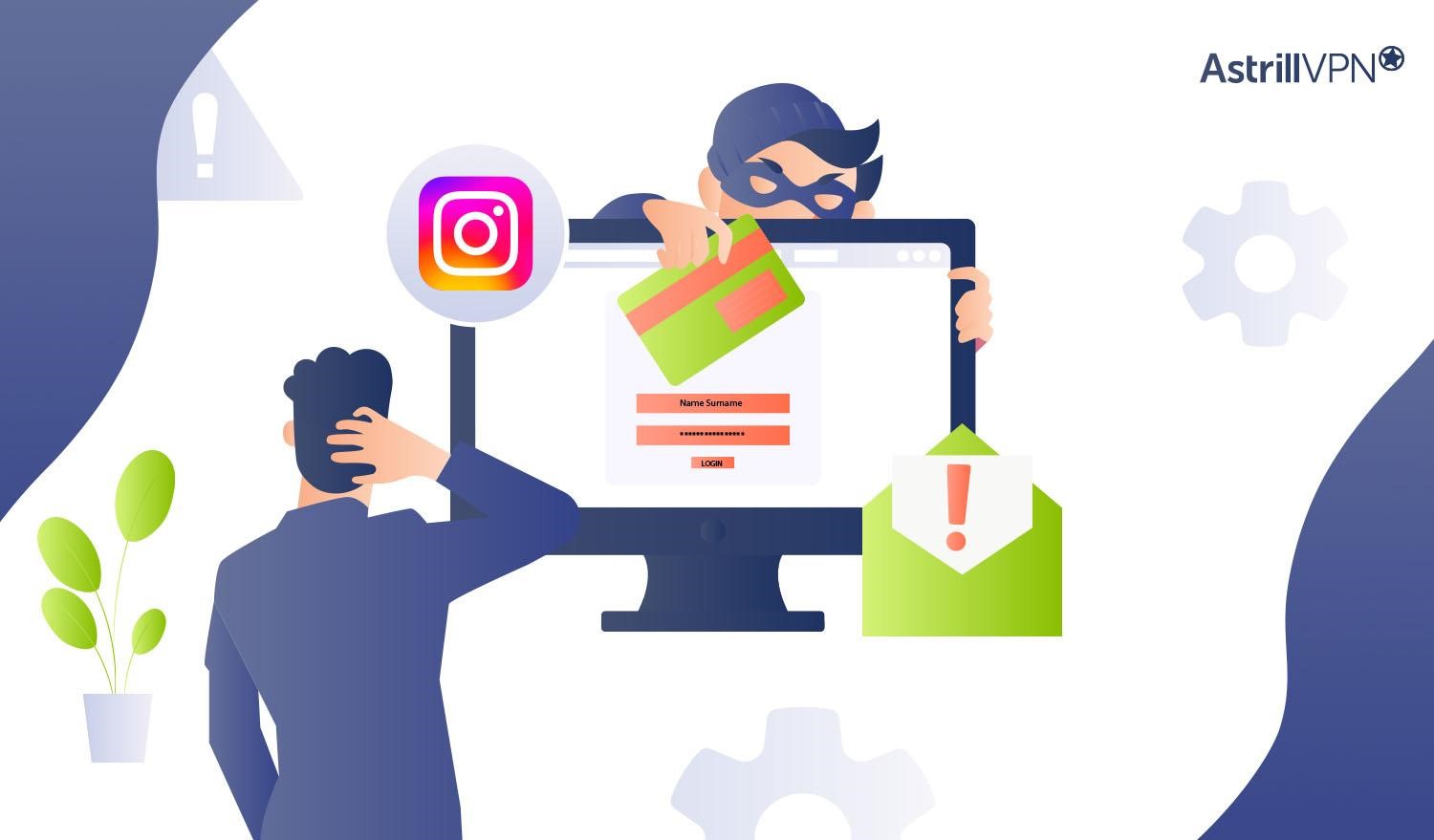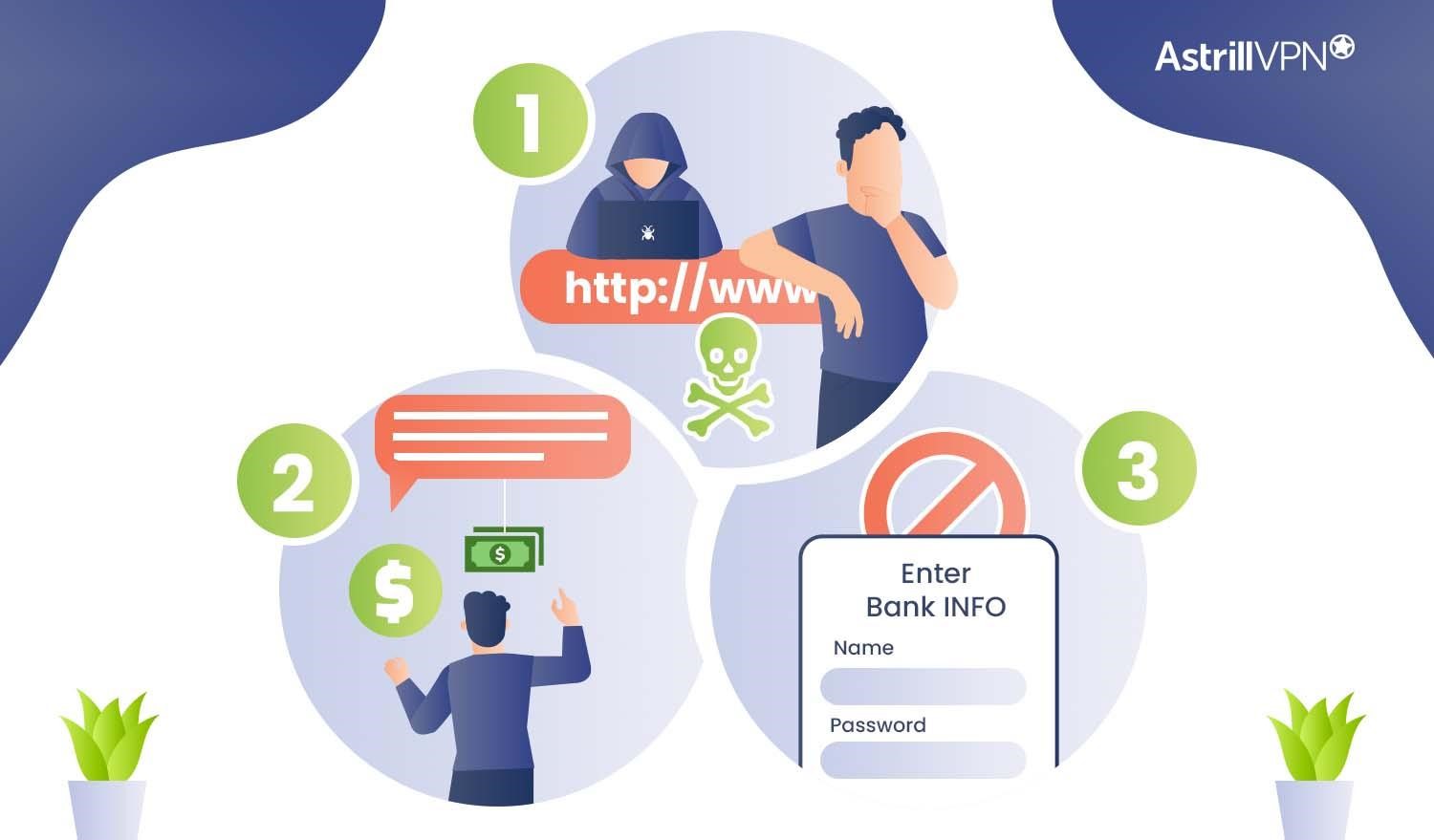The Most Common Instagram Scams (And How to Avoid Them)

Bisma Farrukh

You scroll through your Instagram feed, liking photos from friends and the accounts you follow. But among the travel photos, food pics, and cute animal videos are messages that seem too good to be true. Unfortunately, many of these Instagram offers are scams targeting unsuspecting users. As an avid Instagrammer, you need to watch out for the most common tricks on the platform so you don’t get duped. We’re not talking about the sham products and fake check scams. The scams today are getting more advanced and deceptive, preying on users through follows, likes, and messages. Keep reading to uncover the newest tricks fraudsters are using so you can outsmart them.
Table of Contents
What is an Instagram Scam?
An Instagram scam is when someone tries to trick you into giving them your account info, money, or access to your account. They come in all shapes and sizes, so you need to keep your guard up!
Phishing scams
Phishing scams happen when someone messages you pretending to be Instagram. They’ll say something like “Your account has been hacked! Click this link to reset your password.” Don’t fall for it. Instagram will never ask for your password.
Verification scams
Scammers will promise you a verified badge if you give them money or access to your account. Instagram does not charge money for verification – it’s free.
Like/follow scams
Scammers will offer to boost your likes and follows for a price. Don’t pay them. They often use bots to boost your numbers, and Instagram will likely remove them.
Account hacking
Never click links or download attachments from people you don’t know. Scammers try to get you to enter your login info on fake Instagram sites or download malware that steals your password.
What Are the Most Common Instagram Scams?
There are a few major ones to watch out for:
Phishing links

Be wary of messages or comments with links, even from people you know. Scammers create fake accounts to send phishing links that steal your login info or install malware. Never click links in unsolicited messages.
“You’ve won!” contests

If something sounds too good to be true, it probably is. Scammers run fake contests and lotteries to trick people into providing personal details or sending money to claim a “prize.” Legitimate companies don’t ask for sensitive info or upfront fees to receive winnings.
Fake brand promos

Scammers often pose as popular brands running promotions, giveaways or surveys to get your information or money. Big companies don’t ask for lots of personal details or require a “processing fee” for prizes. Check the account for a verified blue checkmark.
Money flipping scams

Any scheme promising easy money for little effort is a scam. Never send money, gift cards, or wire transfers to strangers who claim they can turn it into more money. You’ll never see that money again.
Recognizing Scam Instagram Messages Signs

Instagram scam messages often contain telltale signs that can help you spot them before getting duped. Look out for:
Suspicious links
- Never click links in unsolicited Instagram messages, especially if promising free stuff, money or account verification. These typically contain malware or steal your login info.
- Be wary of links even from accounts that appear legitimate. Scammers mimic real brands and influencers to seem authentic.
Urgent or emotional language
- Scams often convey a sense of urgency or play on emotions like excitement, fear or greed to get you to act quickly before thinking.
- Claims that you’ve won a contest you never entered or have an inheritance from a long-lost relative are common signs of fraud.
Requests for personal information or money
- Never provide sensitive data, send money or wire transfers to anyone messaging you out of the blue on Instagram.
- Legitimate companies and individuals do not ask for credit card numbers, bank info, copies of ID or money over social media.
- If something sounds too good to be true, it probably is. Trust your instincts.
By staying vigilant for these shady signs, you can avoid becoming a victim of the various money-stealing ruses, phishing schemes and other Instagram frauds running rampant today.
The Instagram Fake Verification Badge Scam
Watch out for messages offering you an Instagram verification badge in exchange for money or personal information. These are scams. Instagram will never ask you for money or sensitive data to verify your account.
The scam usually starts with a message from an account claiming to be Instagram, offering to verify your account for a fee. They may say something like “Congratulations! Your Instagram account has been selected for verification. To receive your verified badge, please click the link below and provide the requested info.”
Do not click the link or provide any information. This is a scam to steal your login info, money, or both. Instagram verification is free and only offered directly through Instagram. They review accounts that meet their criteria to verify based on authenticity, uniqueness, and notability. If your account is selected, Instagram will contact you directly through the app.
Other signs this message is a scam include:
- Poor grammar and spelling errors
- Requests for money, your password, or credit card number
- Promises to instantly verify your account or speed up the official review process
- The message comes from an account with a suspicious username or profile pic
- The link leads to a non-Instagram web address
The only way to get verified on Instagram is to build an authentic, engaged following and hope Instagram’s review process selects you. Don’t fall for verification scams—Instagram will never ask for money or sensitive info to verify you.
Avoiding Instagram Giveaway Scams
Instagram giveaway scams are rampant, so be wary of anything that seems too good to be true. Here are some tips to avoid becoming a victim:
Do research before entering
Double check the account and hashtag to make sure the giveaway is legitimate. Scammers often use handles that are very similar to well-known brands or influencers. They also frequently require you to tag friends in the comments to increase visibility – a tactic used to gain more followers and make the giveaway seem authentic. If something feels off, trust your instincts.
Never provide sensitive information
Do not give out your password, social security number, credit card information or anything else an identity thief could use. Legitimate giveaways only require your username to contact you if you win.
Be cautious of “winners” asking for money
If you’re notified you won and are asked to pay any fees upfront for shipping, taxes or other charges, it’s a scam. Real giveaways provide the prize at no cost to the winner.
Report suspicious activity
If an account seems fraudulent, report it to Instagram right away. The platform is making efforts to crack down on scam accounts and giveaways, but they rely on user reports to help identify offenders. You’ll be doing the community a favor by reporting shady behavior.
By following these tips, you can enjoy giveaways without worry. But when in doubt, it’s best to skip it altogether. Your personal information and money are too valuable to risk over an Instagram freebie. Stay vigilant and trust your gut!
How to Protect Yourself From Instagram Scammers?
The key to avoiding scams on Instagram is using caution and trusting your instincts. If something sounds too good to be true, it probably is.
- Double check profiles before interacting or sharing personal information. Scam profiles often have little content or followers, or were created recently. Don’t send money or gifts to someone you’ve never met in person.
- Be wary of unsolicited messages or friend requests. Scammers frequently send generic greetings to many people hoping for responses. Respond with caution or report and delete the message.
- Never click suspicious links in messages or comments. These could contain malware or steal your login info. Report spam links to Instagram.
- Guard your account details closely. Enable two-factor authentication on your account and use a unique, complex password to make it harder for scammers to hack your Instagram account.
- Stay alert for common scams like fake check fraud, phishing, or inheritance scams. If something sounds off, trust your instincts and avoid engaging further. Report scams to the FTC or FBI Internet Crime Complaint Center.
Following these best practices can help reduce your vulnerability to the various tricks and schemes prevalent on Instagram today.
What to do if you get scammed on Instagram?
If you’ve been scammed on Instagram, don’t panic. Here are some steps you can take:
Report the scam account
Report the account to Instagram immediately. Go to the account profile, select “Report,” then choose “It’s spam” or “I think it’s fake.” Instagram will review the account and likely remove it.
Change your account password
Change your Instagram password right away. Scammers may have accessed your login info, so pick a new strong password to lock them out.
Be wary of phishing links
Watch out for follow-up phishing emails or messages claiming to be from Instagram. Legitimate companies like Instagram will not ask for sensitive info like your password or credit card number via email or DM.
Monitor your financial accounts
Stay vigilant and check statements regularly for unauthorized charges. Take action quickly if you notice anything suspicious.
Spread awareness
Warn your friends and family, especially those who follow you on Instagram. Let them know about the scam so they can be on alert too. Post about your experience to raise awareness in the Instagram community.
You may need to file a police report
If the scam involved theft of funds or sensitive information, you should file a police report about the incident. Provide any details about the scam that could be useful for an investigation.
The key is acting fast by reporting the scam, securing your account, and monitoring for further fraud. Staying proactive and spreading the word about Instagram scams can help prevent others from becoming victims.
FAQs
Yes, be wary of accounts claiming to be “Instagram Official Support.” This is a fake account that messages users saying their account will be deleted if they don’t click a link. Don’t click – it’s a scam!
Absolutely. Never give your Instagram password, username, or any personal information to anyone. Legitimate companies will not ask for sensitive data through Instagram.
Watch out for:
● Messages urging you to act quickly or claim there’s an issue with your account. Legitimate companies will not pressure you or ask for personal information through Instagram.
● Poor grammar and spelling errors. Most scams originate overseas, so the language may seem off.
● Requests for money, gift cards or wire transfers. Never send money or make payments through Instagram.
Conclusion
So there you have it, the most common Instagram scams making the rounds these days. The key is to stay vigilant, trust your instincts, and avoid anything that sounds too good to be true. Never click suspicious links, provide personal information, or wire money to someone you don’t know. And of course, make sure to enable two-factor authentication on your account right away. By taking a few simple security precautions, you can enjoy all the inspiration and entertainment Instagram has to offer without worry. Stay smart, have fun, and don’t let the scammers get you down!

No comments were posted yet